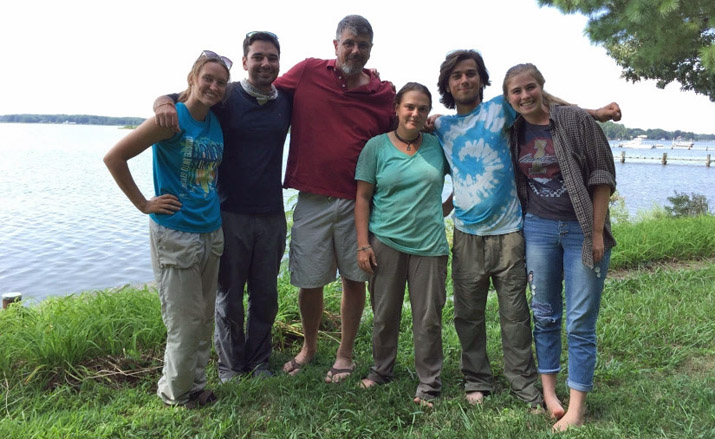Biological Sciences Undergraduate Student Research
Featured Opportunity: Study Diamondback Terrapins in Maryland
From mid-May until early August students join Dr. Willem Roosenburg in Maryland to study diamondback terrapin population dynamics. Students trap and catch turtles, locate turtle nests, and learn state of the art demographic data collection techniques. The field site is a large scale ecological restoration site where students also will learn and witness practical aspects of ecosystem restoration. Students also learn small boat handling and seamanship, UTV handling, and variety of fisheries biology netting and trapping techniques. Most students are hired through PACE or other inhouse funding sources and room and board is provided during the summer.
See More Faculty with Research Opportunities
- Biological Sciences Departmental Honors
- Earning Credits for Research
- Funding Opportunities
- Off-Campus Research Opportunities
- Student Organizations for Those Interested in Research
- Under Graduate Research Immersion Program (UGRIP)
Getting Laboratory and Field Experience
Laboratory experience and fieldwork opportunities in ecology, neuroscience, microbiology, genetics, pathogens, paleontology and much more are available to biology students at OHIO. Some experiences take place in a traditional laboratory, but for many OHIO faculty, their “lab” might entail fieldwork in a forest or a stream.
Involvement in a research laboratory is one of several options that allow students to enhance their college experience. Laboratory experience is highly valuable for those interested in attending professional or medical school. Research experience is essential for those planning to go to graduate school.
How to Find an Undergraduate Research Experience
There are four easy steps:
- Identify a research field of interest.
- Match your research interest with a faculty member's at Ohio University by reading over research summaries of faculty who involve undergraduates in their research.
- Learn more about their research projects by visiting their web pages and reading their publications.
- Email and visit the professor of your choice and discuss the possibility of working in his or her laboratory.
The List of Faculty with Undergraduate Research Opportunities will allow students to get started on steps 1-3. The number of positions is limited, so professors will need to evaluate students' true interest and motivation. (Thus, be sure you are interested and informed before contacting a professor.)
Earning Credits for Undergraduate Research
Biological Sciences majors with at least a 3.0 GPA can register for BIOS 4940 Undergraduate Research. Students who complete a research project may choose to write up that research as a Tier III thesis in BIOS 4941. Also see Biological Sciences Departmental Honors.
BIOS 4941 Undergraduate Research
Prerequisites: 14 credit hours in BIOS, 3.0 GPA in BIOS, permission of faculty research mentor. When a professor in the Biological or Biomedical Sciences department has agreed to have a student do research in their lab, they may enroll the student in this credit/no credit course for 1-3 credit hours per semester, up to a maximum of 8 credit hours. Note that each credit represents 3 to 4 hours of work per week for the entire semester.
BIOS 4941 Senior Research and Thesis (Tier III)
Prerequisites: 3 credit hours in BIOS 4940, 3.0 GPA in BIOS, permission of faculty research mentor and permission of Tier III course instructor. Students who have completed a research project may chose, with agreement of their research mentor, to write up their research as a thesis. Students must also present their research as a poster or in a talk. The course is 3 credit hours and is graded. Students should contact the course instructor no later than the beginning of their senior year if they plan to write a senior thesis.
The Under Graduate Research Immersion Program (UGRIP)
The special learning community of Ohio Center for Ecology and Evolutionary Studies faculty, post-docs, visiting professors, and graduate students provides the opportunity to engage Ecology and Evolutionary Biology undergraduates in scientific inquiry-based learning and research. The UGRIP plan is open to all undergraduate majors related to ecology and evolutionary biology on a competitive basis. It consists of two components (a seminar series and form research courses) designed to engage students during freshman through senior years with research engagement and a formal research course experience in the junior/senior years. The philosophy is to invoke research experience early and in parallel with their core major requirements, then add formal research experience as in the upper years. UGRIP graduates have formal research experience that serves to increase their competitiveness for future employment/ academic opportunities.
Funding Opportunities for Undergraduate Research
There are several paid positions and fellowships available from different sources.
The Provost's Undergraduate Research Fund (PURF) awards up to $1,500 to students conducting original research projects, creative projects, and scholarly work. Funding covers the cost of items such as travel, supplies, and materials that are necessary in order to conduct the research. All requests for funding must be justified in terms of their contribution to the research and the lack of available funds from other sources. Applications are due in early fall semester.
The John J. Kopchick Awards funding undergraduate students working with Molecular and Cellular Biology or Translational Biomedical Sciences faculty and conducting translational medical research and scholarly activities.
Student Enhancement Awards are sponsored by the Ohio University Council for Research, Scholarship and Creative Activity. This program assists undergraduate, graduate, and medical students, under the guidance of a faculty mentor, by providing funds for research and presentation of their research at professional conferences. The awards are based on competitive research proposals and provide funding ($6,000 maximum) for up to one year. Applications are due in early spring semester.
Program to Aid Career Exploration (PACE) positions are administered through the Ohio University Financial Aid office and are intended to provide paid employment in jobs that will enhance career exploration. Students must be financially qualified to apply for PACE positions. A listing of PACE positions becomes available to students accepted into the program in spring semester for the following year.
Voinovich Undergraduate Research Scholars program encourages undergraduate research and supports research efforts of George V. Voinovich School of Leadership and Public Service faculty and professional staff. Honors Tutorial College and Departmental Honors students participate in basic and applied research under this program. Scholar positions are awarded on a competitive basis. Opportunities include working with Voinovich Faculty Research Groups, Institute for Local Government Administration and Rural Development, Appalachian Regional Entrepreneurship Initiative, Environmental Studies faculty, National Business Incubation Association.
Off-Campus Research Opportunities
Contact the pre-health advisor for off-campus research opportunities and information on shadowing and other health-related volunteer experiences.

